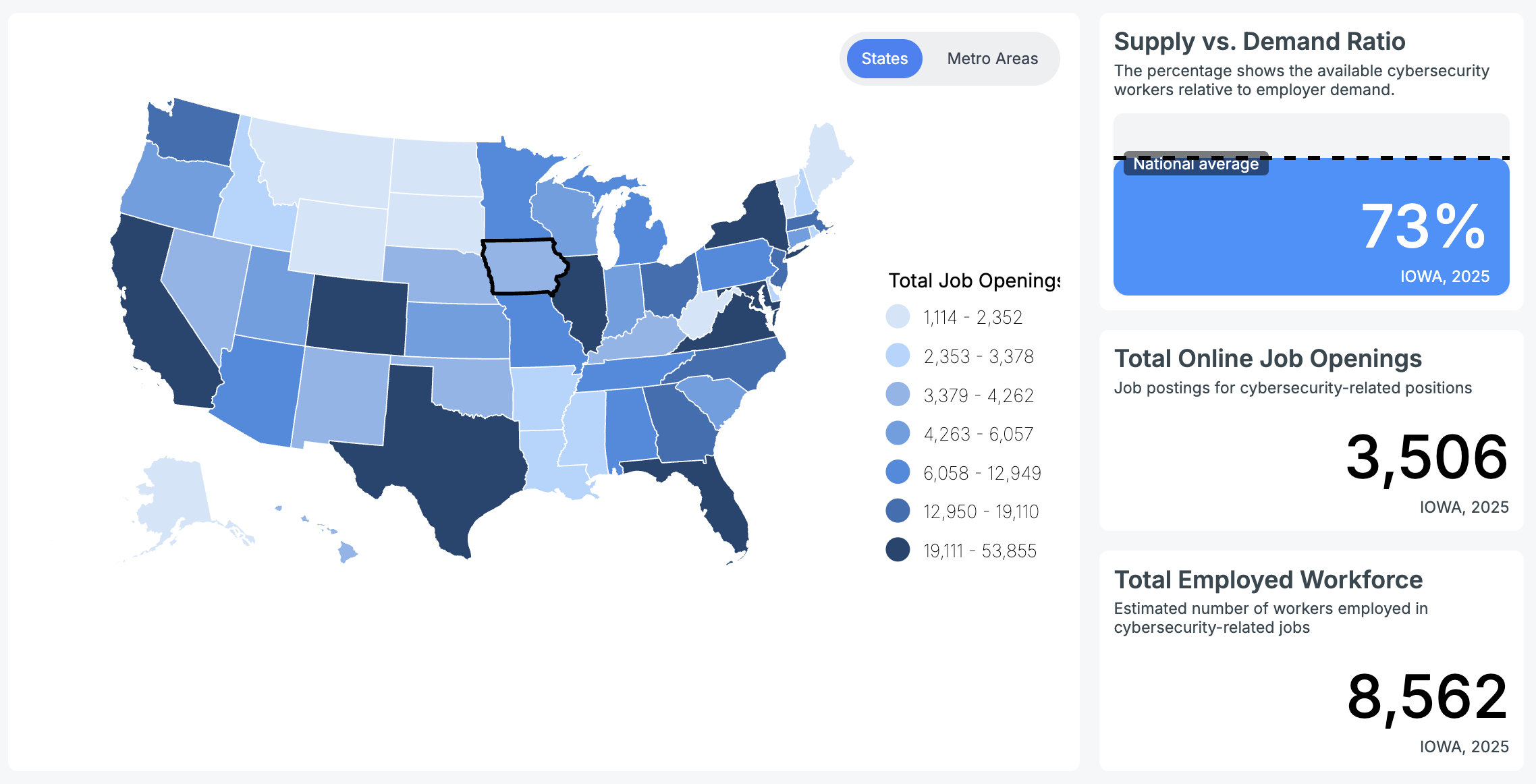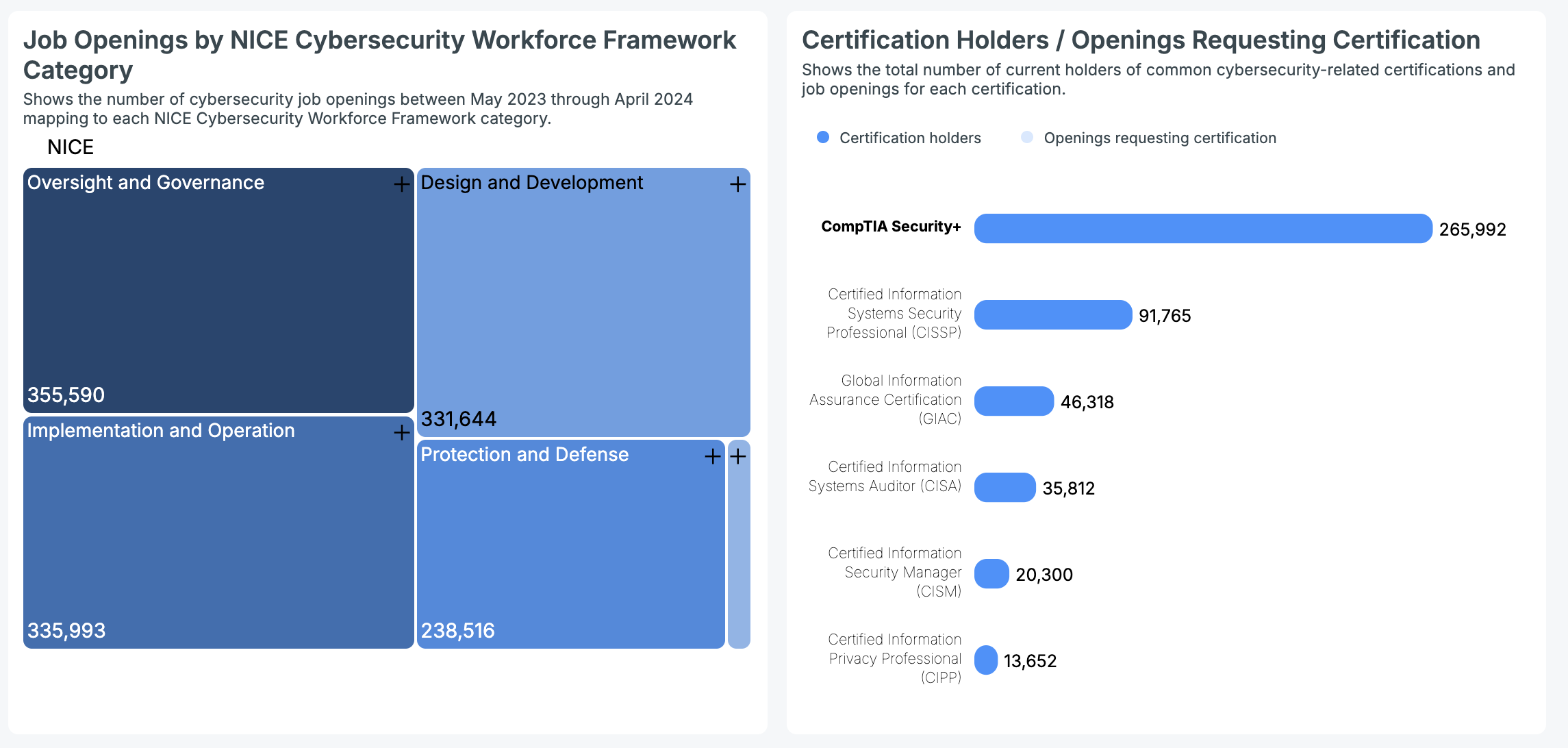- Associate degree
- Bachelor’s degree
- Master’s degree
- Cybersecurity certifications
- Cybersecurity in Iowa
- Jobs in Iowa
This is a comprehensive guide to choosing a cybersecurity school in Iowa as well as other cybersecurity certification and training options.
Although Iowa isn’t exactly a developed hub of digital infrastructure the same way as states like New York or California, it’s still the location of several important companies and is a commercial hub for the entire country. As time goes on, Iowa is developing with more tech companies in its major cities and universities.
Ad
cybersecurityguide.org is an advertising-supported site. Clicking in this box will show you programs related to your search from schools that compensate us. This compensation does not influence our school rankings, resource guides, or other information published on this site.
Featured Cybersecurity Degree Programs
| School Name | Program | More Info |
|---|---|---|
| Purdue Global | Online BS in Cybersecurity | website |
| UC Berkeley School of Information | Master’s in Cybersecurity | No GRE/GMAT Required | website |
| Grand Canyon University | Online BS in Cybersecurity or Online MS in Cybersecurity | website |
| Arizona State University | Online MA in Global Security - Cybersecurity | website |
| Southern New Hampshire University | Online BS in Cybersecurity or Online MS in Cybersecurity | website |
Wells Fargo, a large banking company, and Nationwide, a large insurance company, have major operations in Des Moines, Iowa.
These companies, along with tech companies like Integrity and Dwolla, can be great starting points for cybersecurity professionals in Iowa.
As of now, Iowa is one of the seven states collectively called the “Silicon Prairie,” and its cybersecurity focus is likely to grow. Let’s take a look at this state and see what it can offer for those wanting to study cybersecurity.

Cybersecurity jobs in the U.S were plentiful between May 2023 and April 2024, Oversight and Governance roles topped the list with 355,590 openings. Following closely were Implementation and Operation (335,993) and Design and Development (331,644). Protection and Defense accounted for 238,516 positions, and Investigation had 19,525.
The growing importance of cybersecurity in Iowa
In recent years, there has been a growing number of cyberattacks in Iowa. For example, in 2021, the Iowa Department of Human Services was hit by a ransomware attack that disrupted services for thousands of Iowans.
In 2022, the Des Moines Water Works was targeted by a cyberattack, but the utility was able to defend itself and prevent any disruption of service.
Since then, the Iowa Cybersecurity Office has launched several initiatives to improve cybersecurity in the state, including the Iowa Cybersecurity Awareness Campaign, the Iowa Cybersecurity Incident Response Team, and the Iowa Cybersecurity Maturity Model.
The Iowa Cybersecurity Office (ICO) is also developing the state’s cybersecurity workforce by offering scholarships and internships to students and working with businesses and organizations to create cybersecurity training programs for their employees.
Related resources
Cybersecurity organizations in Iowa:
- Iowa Cybersecurity Office (ICO): Leading cybersecurity agency, working to protect Iowa’s networks and infrastructure from cyberattacks.
- Iowa Cyber Hub: Statewide initiative to promote cybersecurity education and awareness, and to develop a skilled cybersecurity workforce.
- ISACA Iowa Chapter: Global professional association for information systems auditors, control specialists, security professionals, and IT risk professionals. The Iowa Chapter offers a variety of resources and events for cybersecurity professionals in the state.
- ISSA Des Moines Chapter: Global professional association for information security professionals. The Des Moines Chapter offers a variety of resources and events for cybersecurity professionals in the central Iowa area.
- Iowa State University Cybersecurity Club: The Iowa State University Cybersecurity Club is a student-run organization that provides opportunities for students to learn about cybersecurity and to network with cybersecurity professionals.
- University of Iowa Cybersecurity Club: The University of Iowa Cybersecurity Club is a student-run organization that provides opportunities for students to learn about cybersecurity and to network with cybersecurity professionals.
- Northern Iowa University Cybersecurity Club: The Northern Iowa University Cybersecurity Club is a student-run organization that provides opportunities for students to learn about cybersecurity and to network with cybersecurity professionals.
- Drake University Cybersecurity Club: The Drake University Cybersecurity Club is a student-run organization that provides opportunities for students to learn about cybersecurity and to network with cybersecurity professionals.
- Iowa Western Community College Cybersecurity Club: The Iowa Western Community College Cybersecurity Club is a student-run organization that provides opportunities for students to learn about cybersecurity and to network with cybersecurity professionals.
Cybersecurity education in Iowa
Cybersecurity education in Iowa is centered largely around Iowa State University. It’s the only school in Iowa as a National Center of Academic Excellence in Cyber Defense Education and Research: a title meaning that the NSA takes interesting graduates from this university.
Iowa State University has a virtual laboratory to train students across all grade levels about cybersecurity and to inspire competitions and research.
Cybersecurity associate degrees in Iowa
An associate’s degree in cybersecurity is an excellent choice for people who don’t already have a background in computer science. They’ll provide students with the fundamentals of the subject along with other IT knowledge.
- Program: Associate of Applied Science in Cybersecurity
Credits: 67
Cost per credit: $211 in state | $221 out of state
Delivery Method: Campus
Learn more: Program details - Program: Associate of Applied Science in Cybersecurity & Systems Administration
Credits: 86
Cost per credit: $203 in state | $255 out of state
Delivery Method: Campus
Learn more: Program details
Cybersecurity bachelor’s degrees in Iowa
Bachelor’s degrees in cybersecurity are where things get interesting. These degrees provide students with a comprehensive understanding of the subject and enable them to get cybersecurity jobs from major companies or organizations.
Some students stop here and proceed straight into the cybersecurity workforce, while others will proceed to graduate-level education to become administrators or further specialize in the cybersecurity field.
list id=”15030″]
Cybersecurity master’s degrees in Iowa
Master’s degrees are extremely valuable because they mark graduates as well-versed in the cybersecurity field and provide them with further opportunities for specialization. These degrees make graduates well-prepared for cybersecurity jobs in a variety of circumstances and in both government and private organizations.
- Program: Master of Science in Cybersecurity
CAE designation: CAE-CD, CAE-R
Credits: 30
Cost per credit: $588 in-state | $1,488 out of state
Delivery Method: On-Campus, Online
Learn more: Program details
Cybersecurity certifications in Iowa
In the rapidly evolving landscape of cybersecurity, certifications play a crucial role in validating expertise and demonstrating proficiency.
For professionals in Iowa looking to advance their careers or for those entering the field, these certifications can significantly enhance job prospects and provide a recognized standard of knowledge.
As Iowa continues to develop its tech infrastructure and address growing digital threats, the demand for certified cybersecurity talent remains strong.
Here’s a look at the current number of nationwide professionals holding common cybersecurity certifications according to Cyberseek’s data:
- CompTIA Security+: 265,992 certification holders
- CISSP: 91,765 certification holders
- GIAC: 46,318 certification holders
- CISA: 35,812 certification holders
- CISM: 20,300 certification holders
- CIPP: 13,652 certification holders

Cybersecurity certificates can be useful to both professionals in the field and newcomers. They’re short-term, specialized programs that team you with a single aspect or skill relating to cybersecurity.
Certificate program participants can use these programs to obtain new cybersecurity jobs or qualifications, or investigate cybersecurity as a field.
- Program: Cybersecurity Certificate
CAE designation: CAE-CD
Credits: 20
Cost per credit: $185
Delivery Method: Campus
Learn more: Program details - Program: Cybersecurity Certificate
Credits: 16
Cost per credit: $211 in state | $221 out of state
Delivery Method: Campus
Learn more: Program details - Program: Cyber Security Graduate Certificate
CAE designation: CAE-CD, CAE-R
Credits: 12
Cost per credit: $695
Delivery Method: Online
Learn more: Program details
Cybersecurity jobs in Iowa
According to CyberSeek, there are about 3,506 total cybersecurity job openings and 8,562 currently employed cybersecurity workers. Iowa’s capital, Des Moines, is the best place to look for cybersecurity employment, since there are 2,373 total job openings currently.
Job titles for cybersecurity employees in Iowa as just as varied as they are in other states, however. There are plenty of entry-level cybersecurity analysts and risk consultants, and also several positions for cybersecurity managers and administrators.
As a metropolitan center, Des Moines is a focal point for business and finance in the state.
Bureau of Labor Statistics data shared that the average hourly salary for an Iowan cybersecurity professional is $54.30, with a yearly salary of about $112,950. Ultimately, this salary will go quite a long way in Iowa due to a lower cost of living. Even in Des Moines, individuals should be able to make the most of their earnings.
Iowa and cybersecurity
Overall, Iowa can be a great place to study cybersecurity. As it develops and its digital infrastructure becomes more solidified, those who were here at the beginning of its transition into a true “Silicon Prairie” may find themselves quite comfortable.